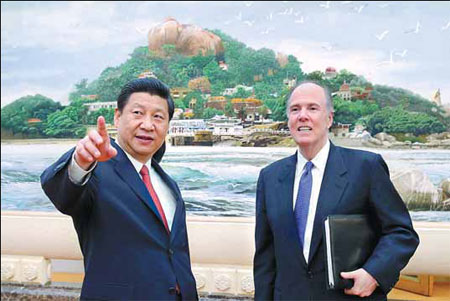More security challenges
China makes new strategy to develop relations with the United States and its neighbors for common good of all
Largely due to its modern history, which is full of sufferings from foreign invasions, China used to have a deep-rooted opinion that links national security tightly with national strength, and concludes that a powerful nation has fewer challenges and security concerns.

China's President Xi Jinping meets US National Security Adviser Thomas Donilon at the Great Hall of the People in Beijing on May 27, 2013. [Photo / Xinhua]
However, the idea is changing as China meets growing challenges and security problems on its rising path, a fact that is increasingly realized by more leaders and scholars. In a speech at the Central Party School this January, Xi Jinping, general secretary of the Communist Party of China who has since also become the president of China, said that "the further our common cause progresses, the more risks and challenges we will face", and "the more unexpected situations will come".
He is right. A rising China will only meet more security problems. An obvious example is Chinese tourists, whose numbers reached 80 million last year. With more Chinese citizens traveling abroad, problems involving their security - turmoil, kidnapping, or earthquakes - are appearing more frequently as headlines. The retreat of over 30,000 nationals during the civil war in Libya best exemplifies this issue. Growing overseas investment is also bringing about new challenges. How to protect the security of investments, transportation and personnel is a new problem in China's national security strategy.
On the macro level, a more serious security concern that comes together with China's rise is the structural dilemma with the US, currently the only global superpower. China might not boast, but to the rest of the world, it is No. 2, with the gap with No. 1 narrowing.
The alarm from the US and its reaction are both obvious. When Turkey tried to purchase missiles from China weeks ago, US President Barack Obama personally gave Turkish Prime Minister Recep Tayyip Erdogan a call persuading him to give up the idea. More recently, the US refused applicants from the Chinese mainland who wished to attend an astronomy conference that will be at the Ames Research Center in California, because the conference is funded by the US National Aeronautics and Space Administration.



















